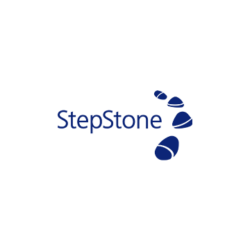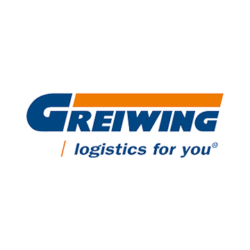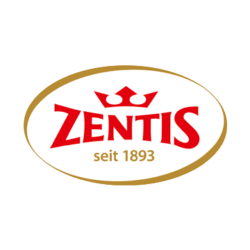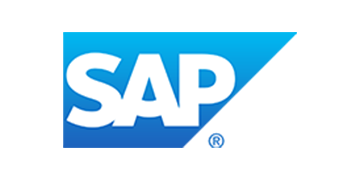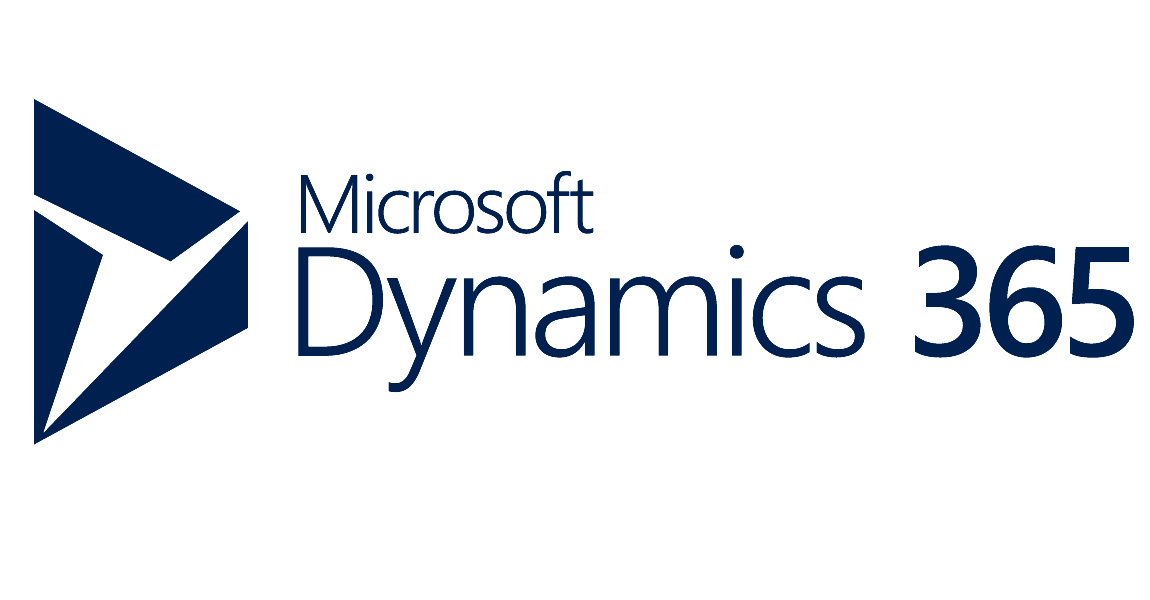Companies and organisations rely on d.velop’s ECM solution.
Definition ECM
What means Enterprise Content Management (ECM)?
Enterprise Content Management (ECM) represents an overall concept that enables uniform management, processing and archiving of all corporate information. It combines various software solutions into a holistic strategy and management concept and supports your business processes with digital functions.
Goals of ECM
What is the aim of Enterprise Content Management?
- Enhanced efficiency through smart functionalities
- Cost reduction across processes
- Seamless integration between diverse system landscapes
- Minimise duplicate documents across systems
- Enable consistent access to all content
- Deliver information independently of source or use case
- Ensure compliance by managing information securely and transparently
The 5 Core Components of a Modern ECM System
The Foundation of a Modern ECM System
Document Management covers all interactions with your company’s documents and data. This includes capturing, managing, storing, archiving, and, if necessary, securely disposing of documents.
A digital document management system (DMS) is the software solution that enables your organisation to fully digitise document handling — from scanning to legally compliant archiving.
The DMS is therefore the foundation for a paperless office.

Automating Business Processes
Business Process Management (BPM) refers to the design, control, and above all, optimisation of business processes. In the context of ECM, the focus is on continuously improving digital workflows and simplifying them through automation.
Workflow management is central to the development and operation of an ECM system. The choice of software and its configuration are directly based on existing workflows. Even after implementation, workflow management remains a key part of quality assurance. Automation and analytics enable flexible, optimised digital processes.

Proper Document Handling within ECM
Both paper-based and digital documents are subject to legal requirements. Records management according to ISO 15489 ensures transparent, traceable, and audit-proof storage – regardless of format.
An ECM system provides core functionalities for document management. Documents can be enriched with additional information such as notes or emails. Any changes are automatically versioned – including timestamps and editor details. The original document remains accessible at all times. The DMS forms the foundation for legally compliant archiving.

Efficient Digital Collaboration
Enterprise Content Management promotes collaboration and prevents data silos.
Cloud-based ECM solutions enable simultaneous document editing with always up-to-date versions. Notes and additional information are stored centrally, ensuring that all authorised users have access to complete content. Comments, approvals, and task management features support direct communication within the document. Knowledge sharing is facilitated through connected systems such as a Learning Management System (LMS).

Efficiently Managing Web Content
A digital corporate presence – whether an intranet or a public website – is now indispensable. Within the broader ECM context, Web Content Management (WCM) also plays a key role. WCM systems, often referred to as Content Management Systems (CMS), enable the structured provision and maintenance of web content. Common solutions include WordPress, TYPO3 and Drupal.
ECM can be meaningfully integrated with existing CMS solutions via interfaces and integrations – supporting a holistic information strategy.
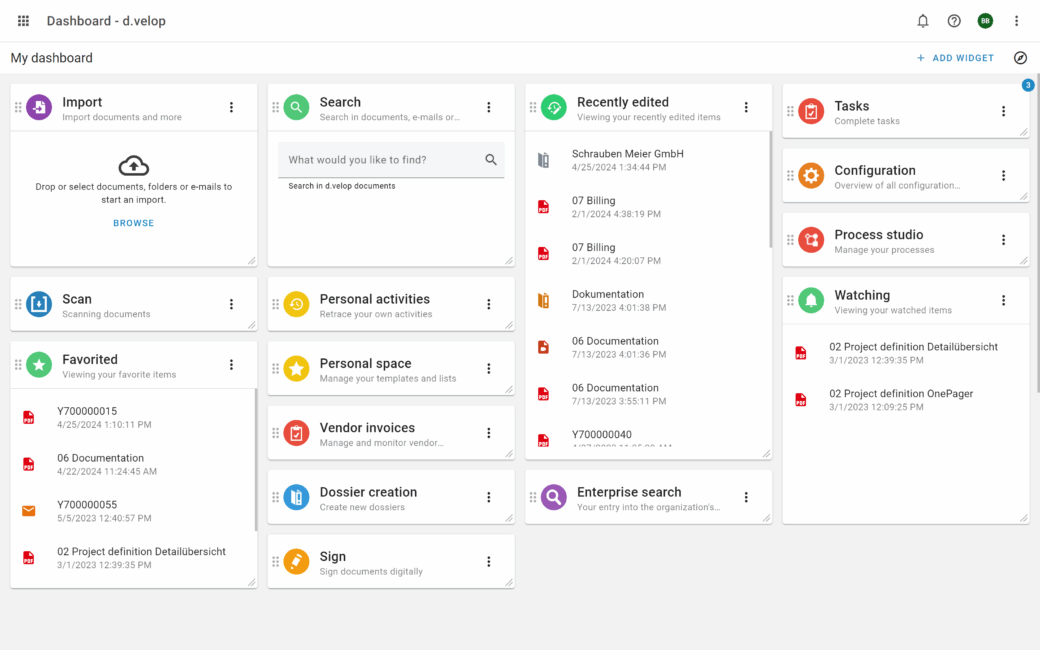

Benefits of ECM
What are the advantages of Enterprise Content Management?
The theory is clear, but what is the concrete impact of an ECM system on the company? ECM providers enable the following advantages for companies with the ECM concept:
Digitalisation as a Driver of Growth
More time for what truly matters: find information faster, automate processes and make productive use of waiting times.
No information gets lost in a mess of paper notes
Centralised storage instead of data silos: A unified and automated filing system for all departments, intelligent search functionality and fast access to all documents.
Collaboration is the new teamwork
Efficient collaboration – internal & external: Work together simultaneously with change tracking or version control, provide relevant information and present it in a clear and traceable way.
Staying competitive
Digitalisation as an investment in the future: Remote work
becomes the standard, enabling rapid responses to change
and gaining an edge through digital processes.
Meeting the Latest Legal Requirements
Legally compliant & future-ready: Fulfil the e-invoicing
obligation, adhere to digital standards and ensure regulatory compliance in your operations.
ECM in the Digital Transformation
Is Enterprise Content Management still up to date?
Digitalisation brings new demands – especially when it comes to business agility. ECM must also adapt to this shift. In this context, vendors are required to fundamentally rethink how they handle digital corporate knowledge. The reasoning is clear: organisations aiming to become more agile and responsive in the market will need different technical support than traditional monolithic software platforms can offer. The long implementation times – often six months or more – make it difficult to respond flexibly to new requirements.
From Archive System to Intelligent Platform –
The ECM Evolution
In the evolution of ECM towards Enterprise Content Services, industry- or department-specific Process Solution Services are gradually complementing traditional monolithic ECM platforms. A key feature of these services is their ability to digitally map entire business processes, including workflows, documentation and archiving components. They can be accessed with just a few clicks and are immediately and fully operational.
Micro Content Services expand this essential portfolio with lightweight services that operate entirely independently of repositories. These include document-related functionalities such as scanning modules, OCR services for automatic text recognition, or cloud-based rendition services.
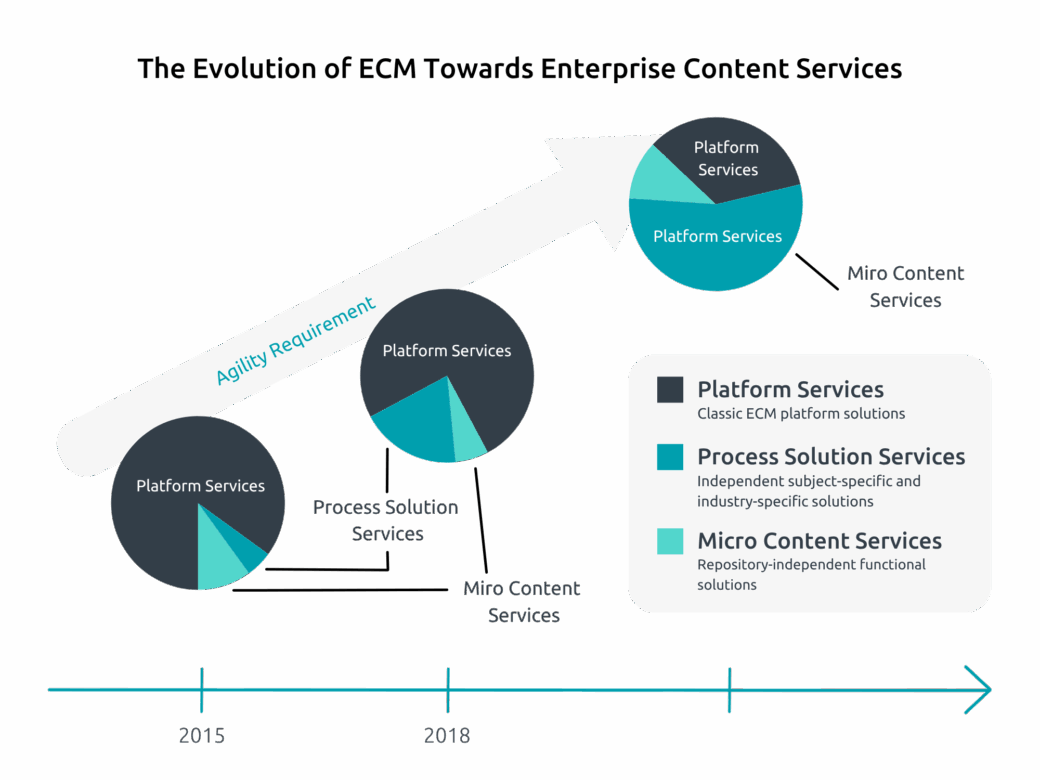
Above these three solution categories, the term Content Services will increasingly represent the logical advancement of ECM. It reflects the growing trend among users towards smart apps, convenient online access and the integration of functionalities into leading applications.
Document management must redefine itself – moving away from rigid platforms towards modular, cloud-based services that digitally support specific business processes.
Flexible Working with App-Based Solutions
An Enterprise Content Management system is no longer limited to desktop use. With app-based solutions, you can access the ECM via mobile devices such as smartphones or tablets, retrieve the information you need or edit documents while on the go. This opens up new possibilities: remote work, flexible working arrangements, cross-location collaboration within a company and even beyond organisational boundaries. With d.velop mobile, you also have direct access to your documents while on the move.
ECM integrations
Seamless System Integration in ECM
An ECM system should integrate smoothly into existing IT environments to avoid media disruptions. d.velop offers extensive integration expertise, providing flexible interfaces to Microsoft 365, SharePoint, SAP, DATEV and other specialised systems. This ensures that familiar working environments remain intact while you benefit from the advantages of centralised and intelligent document management.
A good example is document management for Microsoft 365 and SharePoint, as well as document management for SAP. These applications build on your existing systems and make them more accessible through intuitive use.
ECM in the Cloud
SaaS as the New Standard
“Software as a Service” has now firmly established itself in the world of Enterprise Content Management. In other words, the trend towards the cloud is unstoppable – even in ECM.
Many software providers (e.g. in ERP or CRM) are shifting their core applications entirely to the cloud. As a strong integration partner, d.velop is following this path and both uses and offers all the benefits of a modern cloud-based ECM. But it goes even further: with the d.velop platform, d.velop is evolving Enterprise Content Management into a comprehensive platform for Enterprise Content Services. This platform offers SaaS solutions in a preconfigured standard package, providing intelligent services and apps for managing documents and processes. These can be easily booked via the d.velop store and used with various licensing models. The platform has been recognised by Gartner as a “Visionary” in the Magic Quadrant for Content Services Platforms.
ECM in Practice
Contracts, Invoices, Processes:
How ECM Delivers Real Value
Enterprise Content Management unfolds its true value in practical application. Whether it’s managing contracts, digitally processing invoices or handling other document-based business processes – the following examples show how ECM solutions prove their worth in real-world scenarios.
Contract Management
As a foundation for your company’s operational capability, contract management plays a central role within the ECM system. It goes far beyond simple contract storage, starting at the initiation phase and covering the entire contract lifecycle.
Digital Contract Management – Key Benefits at a Glance
- Transparency and full control over all company contracts
- Optimised workflows
- Automated reminders for terms, deadlines and key dates
- Important contracts are never lost
Invoice Processing
Digital invoice processing is a key component of Enterprise Content Management. The entire invoice workflow is simplified into a digital and automated process, consolidated within the ECM system. It starts with invoice capture, followed by the automatic extraction of all relevant invoice data, through a customisable review and approval workflow, and ends with the handover to your downstream system (ERP, accounting, etc.).
AI in ECM
Intelligence at the Core: AI Transforms ECM into an Active Platform
Artificial intelligence is significantly expanding the capabilities of Enterprise Content Management – especially when it comes to capturing and digitising documents, as well as automating and analysing document-based processes. AI technologies help capture, classify and process content more quickly and efficiently.
AI Assistant d.velop pilot
The d.velop pilot automatically recognises document content, generates summaries and answers questions in natural language via a chat function – directly within the ECM context. This means users can, for example, instantly retrieve information about contract durations or document contents without having to search extensively.
AI-Powered Document Processing
Intelligent Document Processing (IDP) uses AI, machine learning and natural language processing to automatically capture, analyse and process documents. In the ECM context, IDP supports the entire document lifecycle – from recognition and data extraction to structured archiving. This makes processes faster, more secure and largely automated.
AI-Powered Process Automation
By integrating AI into the d.velop process studio, recurring tasks can be automated with ease. Using simple prompts, the AI takes over routine processes and supports the design of efficient workflows. This transforms ECM into an intelligent platform for digital process optimisation.
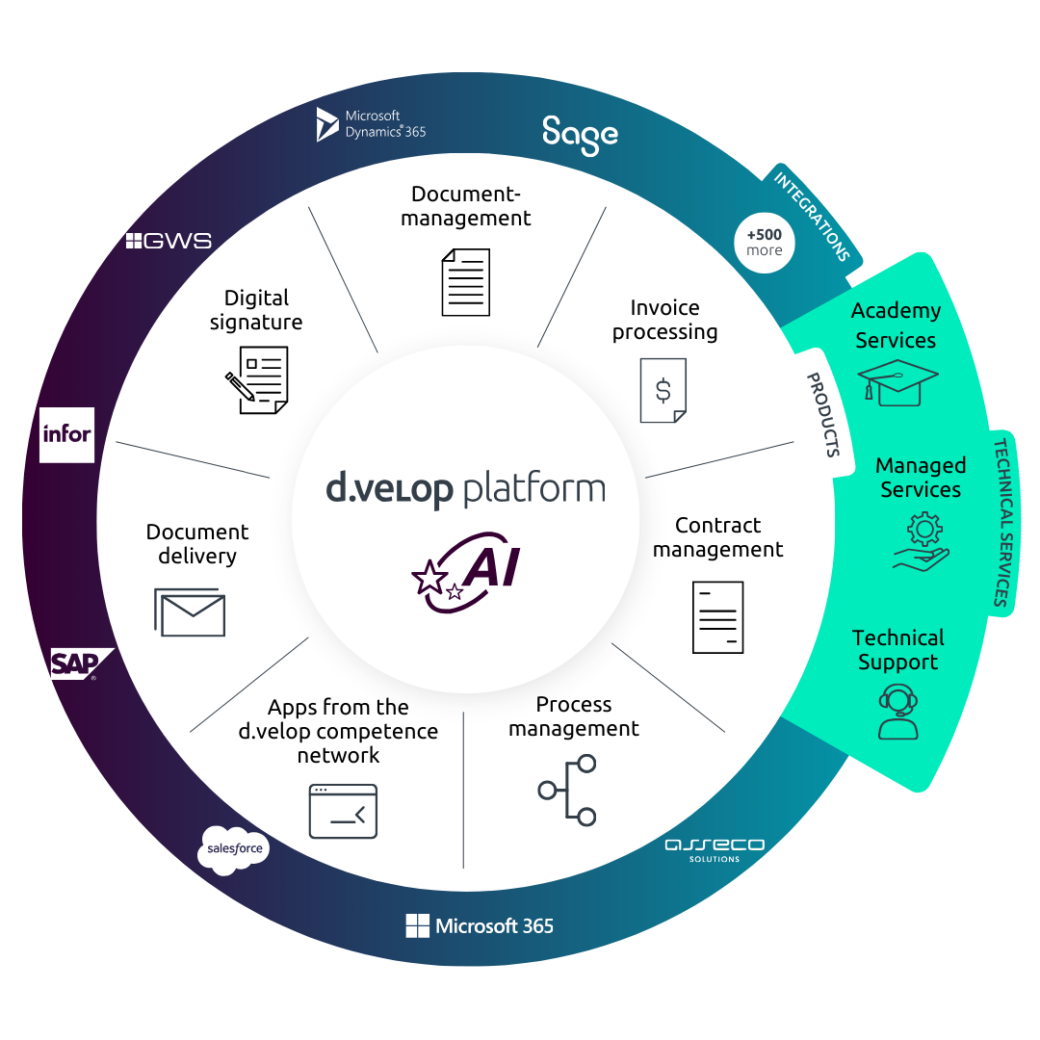
Holistic Digital Transformation
Unlock the Potential of the d.velop platform
A document management system is the ideal starting point for digital transformation. Expand your DMS with powerful solutions from the d.velop platform and embrace holistic digitalisation. Say goodbye to manual processes that cost your employees valuable time – across your entire organisation.
ECM FAQ
The most frequently asked questions about Enterprise Content Management
Enterprise Content Management (ECM) is a software for the holistic, secure and structured management of your company information. It represents an overall concept that is made up of various software solutions (e.g. DMS).
An ECM-system combines many different software solutions into a holistic overall concept. Through interfaces, the software and features mesh like cogwheels and map workflows from start to finish without having to leave the ECM.
SharePoint is part of Microsoft Office 365 and thus represents a content service. Many ECM systems use SharePoint Online as a basis and extend the content platform with many additional functions. In the actual sense, however, SharePoint is only part of an ECM system and serves document management.
Enterprise Content Management has a variety of features, but these again depend on the software selection. Examples are the digital signature, enterprise search and the mobile app. In addition, subsystems of ECM, such as contract management and invoice processing, can again contain their own features.
Actually, one cannot speak of an ECM software, since ECM rather stands for an interaction of different softwares with different functions. Within the ECM system, these softwares interlock and together form the technical basis for all business processes in the company.
The term ECM has existed for a good 20 years – even though the earlier ECM can hardly be compared with today’s ECM. There are therefore voices that describe ECM as a relic and see it being replaced by content service platforms. In fact, a content service is merely the further development of ECM. Due to the many advantages, however, the era of ECM is far from over.
An ECM brings together all the relevant software in a company and links them. Instead of using individual stand-alone solutions and switching systems over and over again, you stay within the ECM and map workflows completely. The benefits are a unified workflow and filing system, a central access point, and greater transparency and collaboration between departments.
An ECM provider is a company that develops, distributes and supports enterprise content management solutions. An ECM is an overall concept that makes it possible to manage, process and archive all of a company’s information in a standardised way. It combines various software solutions into a holistic strategy and management concept and supports your business processes with digital functions.
Contact & Consultation
We Connect Data and People – And Look Forward to Hearing from You.
Curious? We’d be happy to show you our software.
Simply request a live demo

